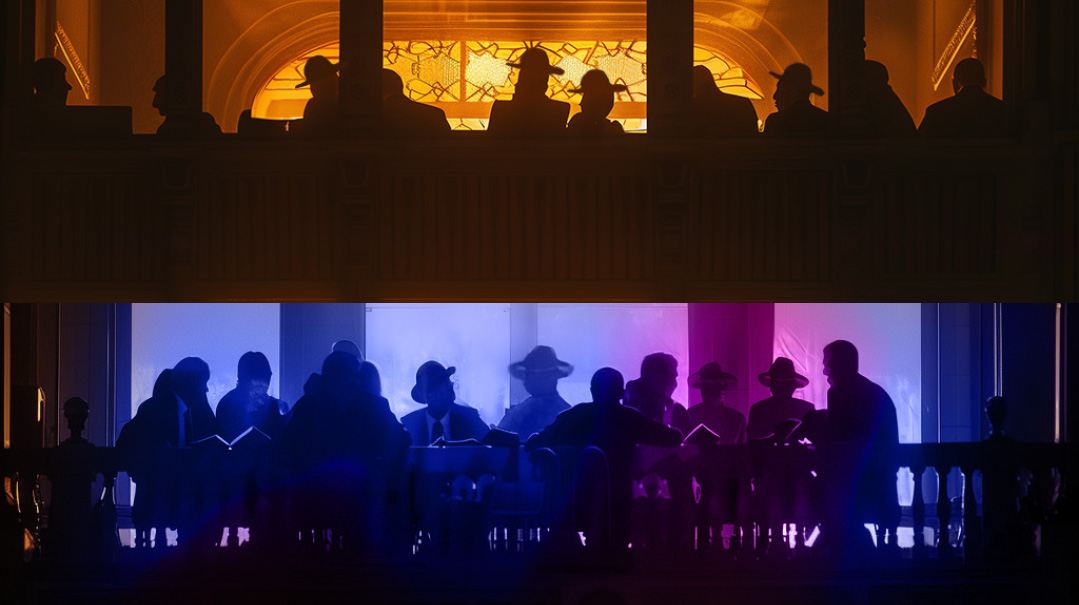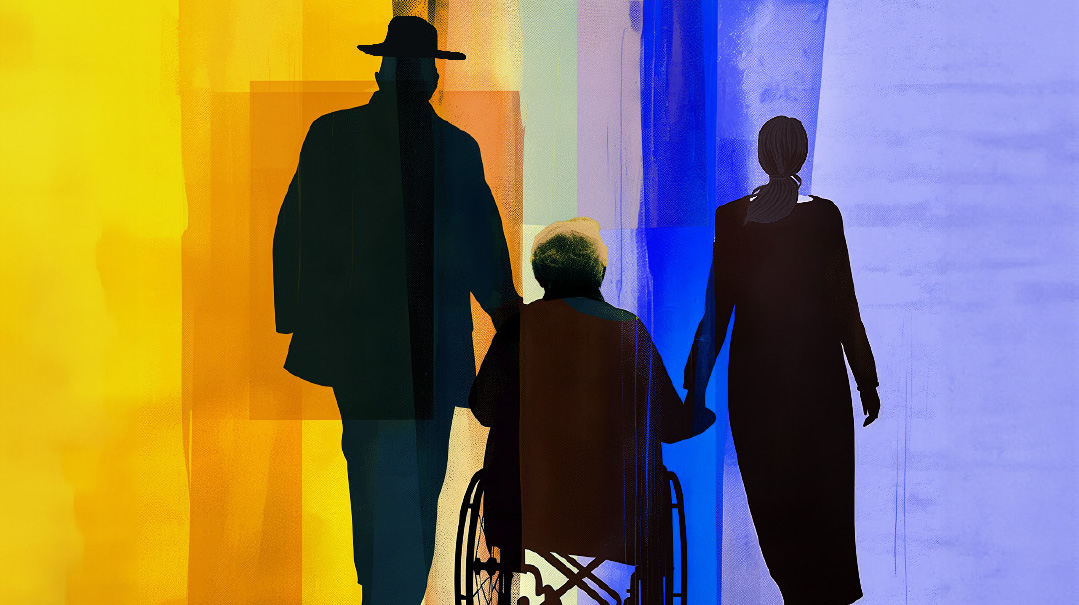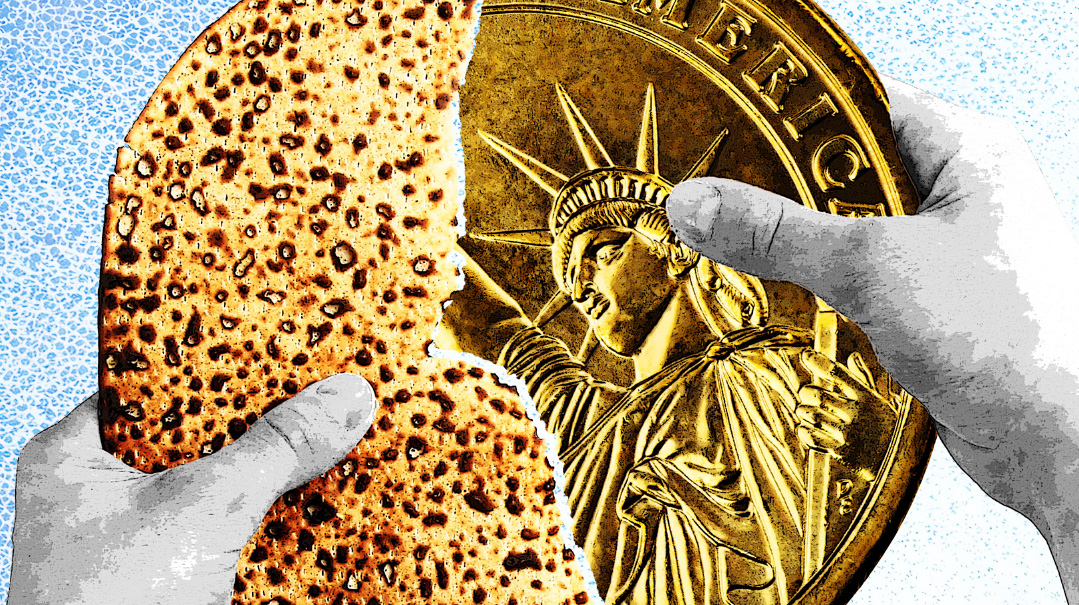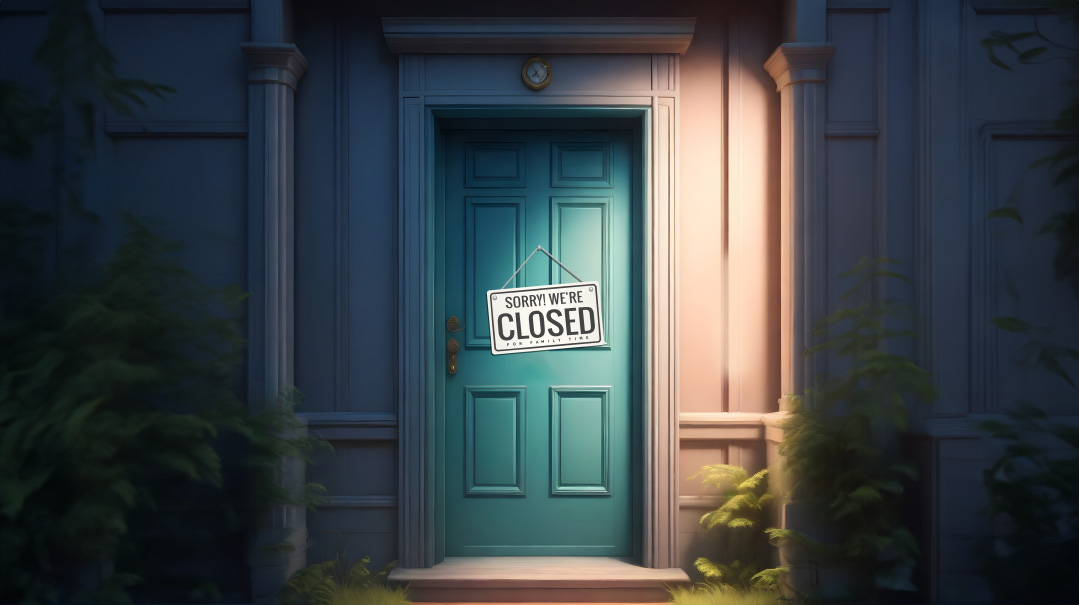Family First


Aryeh: If you really put family first, you’d be willing to accommodate our request.
Ma: If you can’t put your issue aside for three days, then you don’t understand how important family is.
Aryeh
"The longer we push it off,” Miriam said, “the worse it’s going to be.”
I shrugged. “Why rush? You never know what might happen.”
She raised her eyebrows. “What might happen?”
I ticked off the possibilities on my fingers. “They’ll decide to cancel the whole thing. The kids will get the flu and need to be quarantined. We’ll win ten free tickets to Israel for exactly that week.”
“You forgot the UFOs that might come at twilight to spirit us all away.”
“Exactly. See? Lots of things might happen.”
Miriam scrolled through her phone. “I’m just looking at all these texts. Dina: Please send any food preferences or allergy info so we can confirm menu. Dina: Please let us know how many beds and cribs you need. Rafi: Am arranging drivers from airport, whoever is flying please send flight details.” She looked up. “I really think the sooner we tell them, the better.”
“Fine.” I winked. “Go right ahead and tell them.”
She dropped her phone as if it burned her. “Ha, very funny. He’s your brother. You tell him.”
“She’s your sister-in-law. You talk to her a hundred times a day. You tell her.”
Miriam shook her head. “Not anymore.” She looked at me, all the teasing gone from her voice. “Ever since we got back from last year’s reunion Shabbos, I’ve been talking to her less and less. Now I never talk to her. I’m afraid to answer when she calls, what am I going to say? Anyway, she stopped calling. We really need to tell them,” Miriam repeated, “because I’m sure Dina knows by now that something is up, and the longer we wait the more hurtful it’s going to be.”
She was right.
“You tell him,” Miriam said.
I slumped down into a chair. “What should I tell him?”
“The truth,” she said. “We aren’t coming to the reunion weekend this year.”
The annual reunion weekend had been born at Shuly’s Shabbos sheva brachos. Shuly is my youngest sister, the last to get married. Her Shabbos sheva brachos had been held in the shul my parents had davened in for 40 years; all us siblings had stayed at neighbors, childhood friends. It was the tail end of fall, and when Shabbos was over, we gathered for Havdalah on the deck with fireflies winking around us. Everyone had said how nice it was to all be together again and a good thing for simchahs, otherwise we would never see each other.
There was a sudden lull in the conversation, and I think we all realized it at once.
Rafi had said it aloud. “This is the last wedding. Who knows when we’ll all be together again?” Ma’s face fell.
“Hey,” I jumped in. “Aren’t you making Davey’s bar mitzvah soon? So we’ll all be together again then!”
“Davey is ten,” Dina informed us. “And besides,” she tilted her head toward the backyard where the kids were playing some intricate version of tag, “will we all be together then?”
There was a pause. Shuly and Menachem were planning to “start out” in Israel. Would they come back for every bar mitzvah? Miriam and I had come in from Cleveland for the wedding, but when I finished my residency, anything was possible. Manny and Shira lived in Baltimore. Dina and Rafi, Yechiel and Sori, and Libby and Zev all lived in the tristate area… for now. And with Shuly married, it was entirely possible that Pa would finally make good on his threat to move to Florida.
When would we all be together again?
Menachem, the chassan, cleared his throat. “Shuly and I are planning to come back for summer bein hazmanim,” he said. “We hope we’ll be able to see everyone then.”
“Hey,” I said. “We usually come in during the summer, too.”
“You know what?” Dina said. “We should have a reunion. A shabbaton. Or whatever you want to call it. We have room!” Enthusiasm gathered in her voice. “Right, Rafi? We could do it. We could put some extra beds in the basement, we have the guest wing, it can totally work.”
I think she spent the entire winter planning that reunion shabbaton. We arrived on midnight Thursday night (after a harrowing nine-hour drive with the kids). Still, the house was bright and warm, and Dina and Rafi greeted us as if it was 10 a.m. There was a beautiful spread waiting: coffee, tea, cocoa for the kids. Hot kugel, cut fruit, warm chocolate chip cookies. Stella, the help, stepped forward and said, “Can I help you with the baby?” and that was the last we saw of the baby until it was time for her feeding.
It was better than any vacation.
I woke up the next morning disoriented and alarmed that it was 8 a.m., and I hadn’t heard from the kids. But that was because they were in the basement playroom (Dina called it the game room) with their cousins, still in pajamas, and having the time of their lives.
Shuly and Menachem showed up in time to join us on Friday morning for a late brunch (another fantastic spread by Dina and Stella). I sat and schmoozed with my new brother-in-law over coffee and cheesecake (Miriam and Shuly ate sushi salad). The kids were totally absorbed in their cousins who were arriving in groups — first Yechiel and Sori and their five kids, then Libby and Zev with their four… Ma and Pa showed up right before lichtbentshen, and when Ma took her hands away from her face, I could see the tears still in her eyes.
After the seudah, my sister Libby said, “It’s even better than a simchah, we’re so much more relaxed.” And Ma said, “I feel so complete when we’re here, all you children together.”
I turned to Miriam. “Ma is relaxed because all her kids are here with her, and we’re relaxed because all our kids have disappeared somewhere with their cousins.” We both laughed, but it was true.
“We’re not going to see them again until it’s time to leave,” Miriam predicted.
I exaggerated a contented sigh. “Fine with me.”
She was right but I was wrong. We barely saw the kids until it was time to leave. But it wasn’t really fine.
***
“Hi, Rafi?”
“Hey, Aryeh, what’s up?”
“Uh… good, baruch Hashem. You have a minute?”
“Sure.”
He sounded busy, but it was too late.
“Listen,” I started, “about the shabbaton…”
“Yeah?”
“So, Miriam and I really enjoyed the shabbaton the last couple years.” If I sounded rehearsed, well, I was. “I think it’s incredible how you and Dina always put in so much effort to bring everyone together whenever Shuly and Menachem are in town.”
“Yeah, we love it.” He sounded guarded, like he knew there was a but coming.
“And Miriam and I feel like those shabbatons were the best vacations ever,” I continued doggedly, trying not to skip any lines. “You make everyone so comfortable, the food is so amazing, you think of everything. It’s like a five-star hotel just for our family.”
“Yeeeeah…?”
I said it quickly and clearly: “The thing is, Miriam and I don’t think we can make it this year. Please don’t take it personally. We wish it could work, but it just doesn’t.”
A pause. “I don’t get it.”
“I’m sorry,” I said helplessly.
“Would the week before work better for you? Or the week after?”
I shook my head even though he couldn’t see me. “No, that’s not it.”
His voice sharpened. “Is everyone okay? Miriam, the kids?”
“Yes, yes.” Oh, gosh, I didn’t want him to worry. “Yes, everyone’s okay, nothing like that.”
He cleared his throat. “You know, Aryeh, baruch Hashem, we’re doing well, the business… I know it costs a lot to bring the whole family in, we can probably figure something out…”
I literally blushed. “NO,” I said loudly, “that’s not the problem.”
Ugh, I had just admitted there was a problem.
“Well,” said Rafi, with an edge in his voice, “what is the problem?”
I had known it would come to this. Rafi was my brother, I would have to tell him the truth. “I don’t want you to take it personally,” I started. “It’s not your fault… It’s just how things are… It’s not working for us.” I was rambling and I knew it. “You know how the kids spend the whole shabbaton together? We practically don’t see them from when we walk in on Thursday until we leave on Sunday evening. It’s so nice, I love how they’re so close, family is so important, Miriam and I really treasure the relationships…”
Rafi said nothing.
“The problem is that each year, the kids spend the entire time on Thursday, Friday, Motzaei Shabbos, and Sunday playing video games.”
There. I said it.
“And Miriam and I don’t allow our kids to play video games.”
Don’t take it personally. Sure. Miriam and I don’t allow our kids to play video games, and Rafi and Dina have a PlayStation in their playroom. Uh, game room. How are they not going to take that personally?
“That’s all?”
I was startled. “Uh, yeah, that’s all.”
“If not for that problem, you would come?”
“Yes. Of course.” My heart soared. Maybe Rafi would say he’d make the PlayStation off limits for the shabbaton weekend, and everything would be solved!
“So, what’s the big deal? Just tell your kids they can’t play.”
My heart crashed. “Uh… I hear. The thing is that when we come, all the cousins — not only your kids, of course,” I babbled, “all the cousins do the entire time is play video games. So if we tell our kids not to… They’re literally going to have nothing to do the entire weekend.”
Rafi said nothing.
“Do you think we could make, like, a rule, that video games are off limits for the duration of the weekend?”
“But what will they do the entire weekend?”
I was floored. “Run around outside, play ball? Play cards, play board games, schmooze, hang out, eat nosh?”
“Listen Aryeh, they’re your kids, you obviously have the right to raise them as you see fit. And if you don’t want video games in your house, fine, your call. But what’s going to happen if they play some video games for one weekend? What’s the big deal? Do you think that’s going to undo your entire chinuch?”
“Actually…” What was I supposed to say: video games ruin their brains and create neural pathways that interfere with typical cognitive processes’? That we believe the studies that show that violent video games permanently affect the psyche? That we’ve seen that our kids are calmer, stronger, and healthier socially, spiritually, and emotionally without the disruptive effect of video games? Like that’s not going to make him defensive? “I do think, I know actually, that playing video games makes kids violent. What about my idea? I’m sure the kids can entertain themselves without it.”
“I don’t see why we should make them. Why should we all have to follow your rule?”
“You don’t have to follow my rule.” My voice was rising, I struggled to check it. “I’m just saying that if we can’t make that rule… we can’t come.”
“Ma is going to be devastated.”
“I know,” I said softly. “We’re pretty disappointed too. I wish we could work something out.”
“You could work something out,” Rafi said. His voice was hard. “Easily. If you really wanted to. If your relationship with your family was more important to you than some dumb video games. If you wanted your kids to grow up close with their cousins.”
I snapped. “My relationship with my family is very important to me,” I said. “And I would love for my kids to be close with their cousins. What I don’t love is my kids playing a game where they walk into a room, and the whole point of the game is to kill their cousins before their cousins kill them!”
“Aryeh, it’s just a game.” He didn’t sound scornful, just disbelieving. “Tell me the truth. What’s the real reason you don’t want to come?”
“That is the real reason.” Should I say it? “Do you know how harmful these games are to kids’ development? Did you read the research about the World War II soldiers? Did you know video games are implicated in the rise of mass shootings?”
“Are you seriously afraid of your kids becoming mass shooters?” Now he’s derisive, I hurt him.
“No, of course not.” I had slipped into a debate there was no hope of winning. “Listen, Rafi, I’m not telling you how to raise your kids. All I’m telling you is that we can’t come.”
If I could tell Rafi one thing it would be: I thought family was more important than that.
Ma
My parents survived the war.
They survived the war but no one else did. I grew up without grandparents. I grew up without aunts, uncles, or cousins.
Instead, I grew up with stories.
My little sister Mali shared a room with me. She wore two pink bows in her hair. You look just like her… You’re lucky to have a sister.
My brother Mordche presented himself to the Gestapo to save my brother Zev. Stop fighting with your brother.
Of course you can’t go with your friends. You belong here with us. There is nothing more important than family.
As a child, it rankled. I went outside and saw bright skies and green trees. The war was far away and someplace else, and I wanted to go to my friend for Shabbos and couldn’t understand why my mother considered that a betrayal of family.
When I got older, I understood more, and I had the tools to separate the trauma from the truth. And the truth is: there is nothing more important than family.
When Manny started dating, I only wanted to consider a local girl. Eric laughed at me. “You’re becoming one of those,” he said knowingly. “You know, those mothers who don’t want to let their kids grow up and move on.”
Ugh, that hurt. Was he right? Maybe.
“I just… if he finds a local girl, and he’s happy with her, what’s wrong with that?”
Eric just raised his eyebrows.
I lucked out. Manny married Shira, and they lived within walking distance. But after two years, he got a job in Washington, and they moved to Baltimore. Then Rafi married Dina, a “local girl,” like I had hoped, and they stayed close by, and although Aryeh moved to Lakewood after he got married, that wasn’t so far, until he moved to Cleveland to for his residency. Even though Yechiel and Sori and Libby and Zev all stayed in the tristate area, by the time Shuly was redt to a boy from LA who wanted to live in Israel, the whole discussion was moot.
In some ways, Shuly’s wedding was the highlight of my life. What does a Jewish mother dream of if not to see all her children settled and happy and raising families of their own?
Except that… I wished they hadn’t scattered so wide and so far. I was starting to turn into my mother: You belong here with us.
I think that was the greatest nachas of Rafi and Dina’s “family shabbatons.” Those weekends showed me that I had managed, by some miracle, to teach my children that most basic truth — there is nothing more important than family.
***
“It’s such a pity,” Libby sighed, “about the shabbaton. I guess all the good things must come to an end.”
“Hm?” I was rolling out the strudel dough, the phone was stuck between my ear and my shoulder. “What’s that?”
“I said it’s such a pity the shabbaton was cancelled. But I guess nothing lasts forever. Who’s the next simchah? I think Levi’s bar mitzvah is next year, no?”
“What are you talking about?”
A tiny pause. “The shabbaton,” Libby said finally.
“What about the shabbaton?”
“Umm… have you spoken to Rafi lately?”
“Not today.” My voice was sharp. I let go of the dough and sat down, hard. “What’s going on?”
“Umm… maybe you should call Rafi.”
“I would rather if you just told me whatever it is.”
Libby sighed. “Okay. I thought he had spoken to you already. He told me the shabbaton is cancelled.”
I tried to process this. “Did he say why?”
“Uh… no.”
“Libby,” I said sharply.
“He didn’t really tell me, Ma. It could be anything… maybe Dina isn’t feeling well? Maybe there’s stuff going on at work… I really don’t know, Ma. I could tell he was really upset, so I didn’t push.”
He was really upset. I pounced on that tidbit, turning it over in my mind. So Rafi didn’t want to cancel the shabbaton.
“Maybe you should just talk to him yourself?” Libby suggested.
“I think I will,” I said. I dialed him as soon as she hung up.
***
If Eric had been home, he would have made me wait a day to call Aryeh, probably tried to convince me not to call him at all. But he wasn’t home. My hands literally shook as I dialed him.
“Hi, Ma!”
“Don’t ‘Hi, Ma,’ me,” I hissed. “What exactly is going on?”
“Uh… with what?”
“With what? With what. That’s what I want to know! Rafi claims you’re boycotting the shabbaton.”
“I’m not boycotting the shabbaton, I’m just—”
“Just canceling it. That’s all?”
“Rafi canceled it?” He sounded shocked.
“What did you think he would do? Have it without you?”
“I— I didn’t think—”
“You didn’t think. That much is clear.” I twisted the cord around my finger. “Maybe you can think about it a little now and apologize to your brother. Hopefully he’ll still be willing to host it.”
“Ma.” His voice was strained. “Actually, I did talk to Rafi already.”
“Oh, really?”
“Yeah. I explained to him why we couldn’t come. I’m sorry. I didn’t realize he would cancel the whole thing.”
“Of course he canceled it,” I snapped. “What’s the point of everyone getting together if not everyone is together?”
“You know, Ma…” He sounded defensive, but I was too angry to care. “I explained to Rafi why we can’t come, and I offered a solution, but he, uh, felt he couldn’t accommodate us.”
I lifted my eyebrows. “Really? Can you fill me in?”
“Well…” I suddenly remembered Aryeh as a little boy, how he used to shift from foot to foot and look to the side when he was nervous. “Imagine that, like, Tzina had a peanut allergy. And we said we can’t come unless every single thing is peanut free.”
“Tzina has a peanut allergy?”
“No… I’m just saying, it would be reasonable to ask that everything be safe for her to come, right?”
“Okay.”
He sighed suddenly. “Miriam and I hate that the kids play video games the entire weekend. In the past years we’ve tried to curb it, we brought board games and cool toys as gifts and tried to arrange to take the kids out or other entertainment, but it never really works. It’s just becoming more and more of a problem the older the kids get.”
“That is not the same as a peanut allergy.”
“To us it is.” He rushed on. “We thought of arriving late Friday and leaving as soon as Shabbos was over—”
“Oh! But it’s so nice to spend time on Thursday and Sunday — that’s when all the action happens.”
“Action,” he said, with irony. “Anyway, it was too complicated. The trip takes so long as it is, and to come in for just 24 hours would just be too hard. You know what it’s like to travel with kids… and the baby is only six months old.”
“Aryeh.” Does a parent always have to say, sure, okay, or are you sometimes allowed to assert your authority? “Aryeh, I am so glad to hear that everyone is well, and finances are not the issue, and that there are no major crises, but I simply cannot understand how you can break up a family over something like a video game.”
“Ma, do you know what these video games are like?”
“Aryeh, do you know what I would have given, growing up, to have cousins?”
“I know, I know, everyone was killed in the war. Do you want your grandchildren playing games where they’re the killers?” He took a deep breath. “Look, Ma, I didn’t want to say this… You know how kids tantrum, right? And fight with each other? It’s normal, right?”
“Yeah?”
“Okay, so when we got back home last year after the reunion, everyone was cranky and exhausted from the trip. And the kids were fighting… still normal. But then Binyamin grabbed a knife from the counter and waved it threateningly… like you see in the movies. My Binyamin. I’ve never seen anything like that before. It was something he learned there, from those games. He kept doing it. And I never want to see anything like it again.”
“Aryeh,” my voice shook, “look at the big picture here: It’s a weekend when you and your kids get to bond with your entire extended family. If you don’t come, you’re denying me and your father the opportunity to spend time with everyone together. You’re denying that to everyone — everyone who loves you more than you love them, apparently!”
Aryeh only sighed.
If I could tell Aryeh one thing it would be: If you understood how precious family really is, you’d swallow your issues for three days and accept an invaluable gift.
(Originally featured in Mishpacha, Issue 753)
Oops! We could not locate your form.












